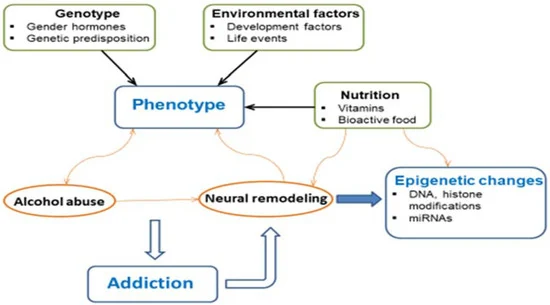Alcohol use disorder (AUD) is a complex condition influenced by a combination of genetic, environmental, and psychological factors. Understanding the role of genetics in the development of AUD can provide valuable insights into why some individuals are more susceptible to addiction and help tailor more effective alcohol use disorder treatment strategies.
The Role of Genetics in Alcohol Use Disorder
Genetic Predisposition: Research indicates that genetics play a significant role in the risk of developing AUD. Studies of families, twins, and adopted individuals have shown that genetics account for approximately 50-60% of the risk for alcoholism. This means that individuals with a family history of AUD are more likely to develop the condition themselves.
Key Genes Involved: Several genes have been identified that contribute to the risk of AUD. These genes are involved in various aspects of alcohol metabolism, brain chemistry, and behavior. Some key genes include:
- ADH1B and ALDH2: These genes encode enzymes that are critical for alcohol metabolism. Variants in these genes can affect how quickly alcohol is broken down in the body, influencing an individual’s risk of developing AUD. For example, certain variants of the ALDH2 gene, common in East Asian populations, result in a slower breakdown of acetaldehyde, a toxic byproduct of alcohol metabolism. This causes unpleasant symptoms such as flushing and nausea, which can reduce the likelihood of heavy drinking.
- GABRA2: This gene is involved in the function of GABA, a neurotransmitter that has a calming effect on the brain. Variants in the GABRA2 gene have been associated with an increased risk of AUD, possibly due to their impact on stress response and anxiety levels.
- DRD2: This gene encodes the dopamine D2 receptor, which plays a key role in the brain’s reward system. Variants in the DRD2 gene can affect the sensitivity of the reward system to alcohol, influencing the likelihood of developing AUD.
Epigenetics: In addition to genetic predisposition, epigenetic factors also play a role in AUD. Epigenetics refers to changes in gene expression that do not involve alterations to the DNA sequence itself. Environmental factors, such as exposure to alcohol, stress, and trauma, can cause epigenetic changes that influence the risk of AUD. Understanding these epigenetic mechanisms can help identify individuals at higher risk and develop targeted prevention strategies.
Implications for Treatment and Prevention
Personalized Treatment: Understanding the genetic factors involved in AUD can lead to more personalized and effective treatment strategies. For example, individuals with specific genetic variants affecting alcohol metabolism might benefit from tailored medication-assisted treatment (MAT) approaches. Genetic testing can help identify these variants and guide treatment decisions.
Medication Development: Research into the genetic basis of AUD can also inform the development of new medications. By targeting specific genetic pathways involved in addiction, researchers can develop drugs that more effectively reduce cravings and prevent relapse. For example, medications that modulate the GABA or dopamine systems might be particularly beneficial for individuals with certain genetic profiles.
Early Intervention and Prevention: Identifying individuals with a genetic predisposition to AUD can facilitate early intervention and prevention efforts. Genetic screening and family history assessments can help identify those at higher risk, allowing for proactive measures such as education, counseling, and monitoring to reduce the likelihood of developing AUD.
Addressing Environmental and Psychological Factors: While genetics play a significant role, environmental and psychological factors are also critical in the development of AUD. A comprehensive approach to treatment and prevention must address these factors alongside genetic predisposition. This includes providing support for mental health issues, addressing trauma, and promoting healthy coping mechanisms.
Integrating Genetic Counseling: Genetic counseling can be an important component of AUD treatment and prevention. Genetic counselors can help individuals understand their genetic risk, interpret genetic testing results, and make informed decisions about their treatment and lifestyle. This personalized approach can empower individuals to take proactive steps in managing their risk of AUD.
Research and Future Directions
Advancing Genetic Research: Continued research into the genetic basis of AUD is essential for improving our understanding of the condition and developing more effective treatments. Large-scale genome-wide association studies (GWAS) and other genetic research initiatives can identify new genetic variants associated with AUD and uncover the biological mechanisms underlying addiction.
Epigenetic Studies: Epigenetic research is another promising area that can provide insights into how environmental factors interact with genetics to influence AUD risk. Understanding these interactions can lead to the development of targeted interventions that address both genetic and environmental components of the disorder.
Translational Research: Translational research aims to bridge the gap between basic genetic research and clinical practice. By translating genetic findings into practical applications, such as new medications, diagnostic tools, and personalized treatment plans, researchers can enhance the effectiveness of AUD treatment and prevention efforts.

